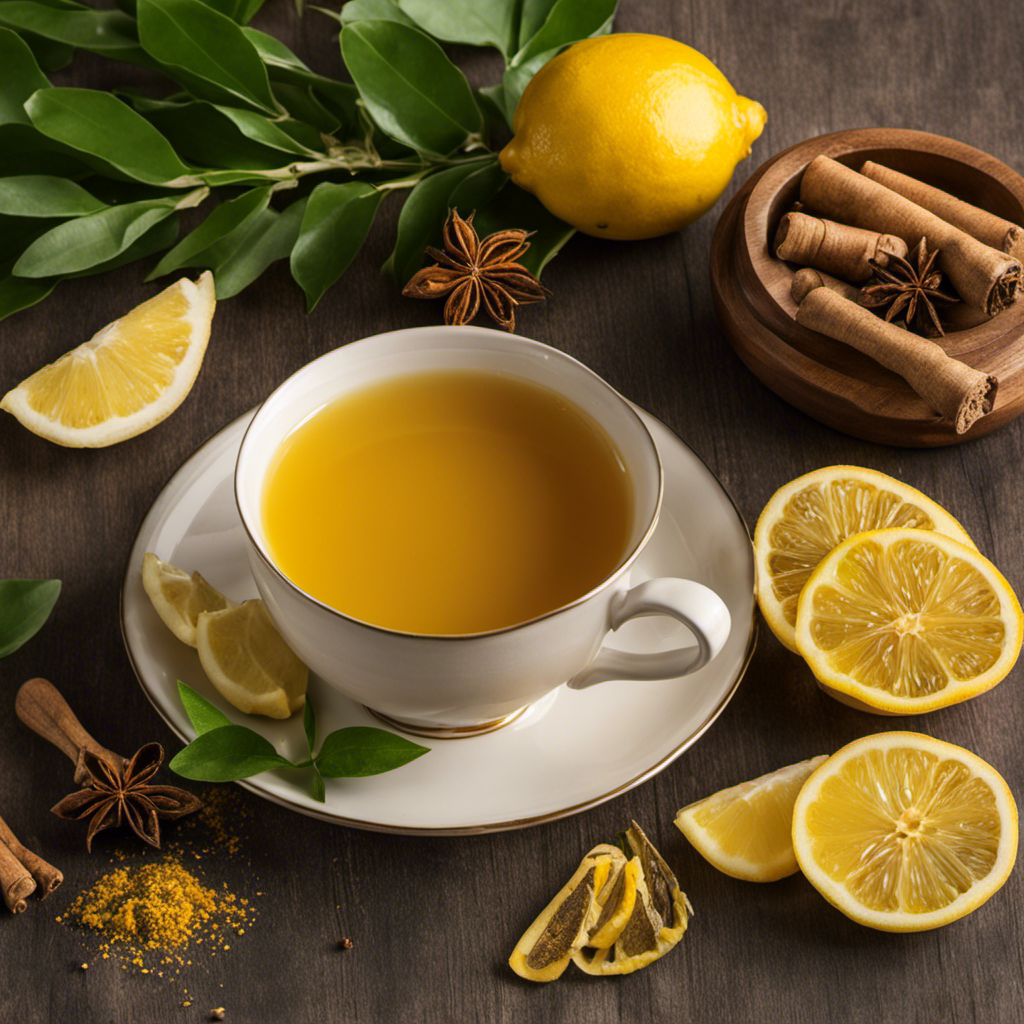Coffee Alternatives And Tea
The Healing Power Of Rosehip Tea: A Natural Remedy For Various Health Conditions

Imagine a cup of rosehip tea, gently steeping and releasing its healing powers with every sip, much like the sun nourishing a garden with its warm rays.
Rosehip tea, derived from the false fruits of the rose plant, has been treasured for centuries for its remarkable health benefits. Packed with essential nutrients such as Vitamin C, tannins, pectin, and thiamin, rosehips offer a natural remedy for a multitude of health conditions.
This humble tea possesses an array of therapeutic properties, including powerful antioxidants, anti-inflammatory agents, antimicrobial compounds, and even potential anti-cancer effects.
Research suggests that rosehip tea may aid in the treatment of colon or lung cancer, while rosehip powder may alleviate pain in arthritis patients. Furthermore, rosehips from the Rosa damascena species hold promise in the battle against Alzheimer’s disease.
In this article, we will explore the myriad benefits and uses of rosehip tea, as well as provide guidance on its preparation and dosage. However, it is crucial to remember that seeking professional medical advice is essential, especially when considering herbal remedies for serious health conditions.
So, grab a cup of rosehip tea and embark on a journey towards holistic well-being and natural healing.
Key Takeaways
- Rosehip tea is rich in essential nutrients and possesses therapeutic properties.
- Research suggests that rosehip tea may aid in the treatment of colon or lung cancer and alleviate pain in arthritis patients.
- Rosehips from the Rosa damascena species hold promise in the battle against Alzheimer’s disease.
- Professional medical advice should be sought when considering herbal remedies for serious health conditions.
What is it?
I know that rosehip tea is a natural remedy made from the false fruits of a rose plant and is known for its healing properties for various health conditions. The nutritional composition of rosehips is quite impressive. They’re rich in Vitamin C, tannins, pectin, and thiamin. In fact, rosehips have higher anti-oxidative activity than blueberries, chokeberry, blackcurrant, rowan berry, and hawthorn. This makes them a powerful source of antioxidants.
Rosehip tea also has a long history and cultural significance. It’s been used for centuries in traditional medicine around the world. The most commonly used plant for harvesting edible rosehips is the wild Dog Rose or Rosa canina, but other rose plants like Rosa rugosa, Rosa rubiginosa, and Rosa arvensis can also be used.
Overall, rosehip tea is a natural remedy that offers a wide range of health benefits due to its nutritional composition and long history of use in traditional medicine.
Benefits and Uses
Rosehip tea offers a range of advantages and applications for improving overall well-being. This herbal tea is packed with nutrients, including Vitamin C, tanning, pectin, and thiamin. It has powerful antioxidant, anti-inflammatory, antimicrobial, anti-diabetic, and even anticancer effects.
In fact, rosehips have been found to have higher antioxidant activity than popular berries like blueberries and blackcurrants.
One of the great benefits of rosehip tea is its potential in treating various health conditions. It may help reduce pain in patients with osteoarthritis and rheumatoid arthritis, thanks to its anti-inflammatory properties. Rosehips from Rosa damascena have shown promise in treating Alzheimer’s disease. However, it’s important to note that rosehip tea should be avoided in estrogen-dependent tumors.
To enjoy the benefits of rosehip tea, you can try different recipes using dried or fresh rosehips. It can be steeped or boiled in water to extract its healing properties. It’s always wise to seek professional medical advice, especially if you have serious medical conditions.
Additionally, keep in mind that like any herbal tea, rosehip tea may have potential side effects, so it’s important to consume it in moderation.
Preparation and Dosage
To prepare rosehip tea, gather either dried or fresh rosehips and steep or boil them in water. There are various rosehip tea recipes available online, but the basic method involves removing the seeds from the rosehips and then simmering them in water for about 10-15 minutes. You can also use a tea infuser or tea bag to steep the rosehips in hot water for a few minutes.
The dosage of rosehip tea may vary depending on the individual and the specific health condition being addressed. It’s generally recommended to start with one cup of rosehip tea per day and gradually increase the dosage if needed. However, it’s important to note that excessive consumption of rosehip tea may lead to potential side effects such as diarrhea or stomach upset.
As with any herbal remedy, it’s always best to consult with a healthcare professional before using rosehip tea for serious medical conditions.
Frequently Asked Questions
Can rosehip tea be consumed during pregnancy?
When considering the safety of consuming herbal teas during pregnancy, it is important to exercise caution. While rosehip tea is generally considered safe, it is advisable to consult with a healthcare professional. Alternatives for overall well-being include chamomile and ginger teas.
Are there any potential side effects or interactions with medications when consuming rosehip tea?
Potential drug interactions and the safety of rosehip tea for children should be considered. It is important to consult with a healthcare professional, as rosehip tea may interact with certain medications and its safety for children is not well-established.
Can rosehip tea help with weight loss or management?
Rosehip tea may aid in weight loss or management by boosting metabolism and promoting appetite control. Its rich vitamin C content and potential anti-inflammatory effects may support a healthy weight. However, professional advice is recommended.
Is it safe to consume rosehip tea on a daily basis?
To answer the current question, it is generally safe to consume rosehip tea daily. However, safety concerns include potential interactions with medications and allergies. Recommended dosage varies, but it is advisable to consult a healthcare professional for personalized guidance.
Are there any specific storage requirements for dried rosehips used to make tea?
Storage tips for dried rosehips used to make tea include keeping them in an airtight container in a cool, dark place. To prepare rosehip tea, steep 2 tablespoons of dried rosehips in boiling water for 10-15 minutes.
Conclusion
In conclusion, rosehip tea is a natural remedy that offers a wide range of health benefits. It’s packed with nutrients and powerful antioxidants, and it has the potential to treat various health conditions such as cancer, arthritis, and even Alzheimer’s disease. However, it’s crucial to consult with a healthcare professional before incorporating rosehip tea into your treatment plan. While this herbal remedy shows promise, it’s important to approach holistic healing with caution. Remember, one sip of rosehip tea isn’t a magic cure-all, but it can be a valuable addition to a balanced and mindful approach to wellness.
Noah, the Editor-in-Chief at Cappuccino Oracle, plays a pivotal role in shaping the voice and vision of our renowned platform. With an unwavering passion for coffee, coffee alternatives, and tea, Noah leads Cappuccino Oracle towards new horizons in the realm of coffee journalism.
Beyond his professional responsibilities, Noah serves as a mentor and guiding force for his team. His dedication to journalistic excellence and genuine love for coffee, coffee alternatives, and tea continue to inspire and motivate the Cappuccino Oracle family. In the ever-evolving world of these beverages, Noah’s leadership ensures that our platform remains at the forefront, delivering enlightening and enjoyable content to our readers worldwide.
Turmeric Tea
Turmeric Tea for Fever

If you’re seeking a natural solution to combat a fever, consider trying turmeric tea.
Packed with powerful antioxidants and anti-inflammatory properties, this golden elixir can provide relief and support your body’s immune system.
In this article, we will explore the benefits of turmeric for fever and provide you with a simple recipe to make your own soothing turmeric tea.
So grab your mug and let’s dive into the world of turmeric tea for fever.
Key Takeaways
- Turmeric has natural anti-inflammatory properties and contains curcumin, which has anti-inflammatory effects.
- Turmeric tea is easy to make and can provide relief for fever symptoms.
- Start with a small amount of turmeric and gradually increase the dosage, and it is generally recommended to have 1-2 cups of turmeric tea per day.
- It is important to consult with a healthcare professional before adding turmeric tea to your routine, as it may interact with certain medications or have adverse effects for some individuals.
The Benefits of Turmeric for Fever
If you’re looking to reduce a fever, turmeric can be beneficial due to its natural anti-inflammatory properties.
Turmeric contains a compound called curcumin, which has been shown to have anti-inflammatory effects.
These effects can help to reduce inflammation in the body, which can contribute to fever.
Turmeric can be consumed in various forms, including turmeric supplements and turmeric recipes.
Turmeric supplements are available in capsule or tablet form and can be taken daily to support overall health.
Turmeric recipes, such as turmeric tea, can be made by combining turmeric powder with hot water and other ingredients like ginger and honey.
These recipes provide a warm and soothing drink that can help to alleviate fever symptoms.
How to Make Turmeric Tea
To make turmeric tea, simply combine the ingredients and steep for a few minutes.
Turmeric tea recipes are easy to follow and offer a range of health benefits. Turmeric, a vibrant yellow spice, has been used for centuries in traditional medicine for its anti-inflammatory and antioxidant properties. It contains a compound called curcumin, which has been shown to have various health benefits, including reducing inflammation, boosting immunity, and improving digestion.
Turmeric tea can be made by combining one teaspoon of turmeric powder with hot water or milk, adding a pinch of black pepper to enhance its absorption, and sweetening it with honey or lemon if desired.
In addition to its use as a beverage, turmeric can also be used as a spice in cooking or as a natural dye for fabrics. Its versatility makes it a valuable ingredient in various recipes and alternative uses.
Dosage and Timing for Turmeric Tea
The recommended dosage and timing for turmeric tea may vary depending on individual needs and health conditions. When it comes to dosage recommendations, it is generally suggested to start with a small amount and gradually increase it over time. A common dosage is 1-2 teaspoons of turmeric powder per cup of hot water. You can have 1-2 cups of turmeric tea per day.
As for the best time to drink turmeric tea, many people prefer having it in the morning on an empty stomach to kickstart their day. Others find it beneficial to have it before meals to aid digestion. However, it is important to consult with your healthcare provider to determine the most suitable dosage and timing for your specific needs.
Transitioning to the next section, here are some tips for enhancing the effectiveness of turmeric tea.
Tips for Enhancing the Effectiveness of Turmeric Tea
Start by adding a pinch of black pepper to your turmeric tea for increased absorption and effectiveness. Black pepper contains a compound called piperine, which has been shown to enhance the bioavailability of curcumin, the active compound in turmeric. This means that your body can better absorb and utilize the beneficial properties of turmeric.
To make turmeric tea, you can try various recipes. One common recipe involves boiling water and adding turmeric powder, ginger, and a sweetener like honey or maple syrup. You can also experiment with adding other ingredients like lemon or cinnamon for additional flavor and health benefits.
Turmeric tea is often praised for its anti-inflammatory properties. Curcumin has been shown to reduce inflammation in the body, which can help alleviate symptoms of conditions like arthritis and inflammatory bowel disease. However, it’s important to note that more research is needed to fully understand the effects of turmeric tea on inflammation.
Now that you know how to enhance the effectiveness of your turmeric tea, let’s discuss the precautions and possible side effects of consuming it.
Precautions and Possible Side Effects of Turmeric Tea
Make sure you consult with a healthcare professional before adding turmeric tea to your daily routine, as it may interact with certain medications or have adverse effects for individuals with certain medical conditions.
Turmeric tea contains a compound called curcumin, which has been found to have anti-inflammatory and antioxidant properties. However, it can also interact with certain medications, such as blood thinners and drugs for diabetes, potentially increasing the risk of bleeding or affecting blood sugar levels.
Additionally, some individuals may be allergic to turmeric, experiencing symptoms like skin rashes, itching, or difficulty breathing. It’s important to be aware of these potential interactions and allergic reactions to ensure the safe consumption of turmeric tea.
Consulting with a healthcare professional can help determine if turmeric tea is suitable for you and your specific medical situation.
Frequently Asked Questions
Can Turmeric Tea Help With Other Symptoms of Fever, Such as Body Aches and Chills?
Turmeric tea can help alleviate symptoms of fever, including body aches and chills. It is a natural remedy that can be used as an alternative to over-the-counter fever medication.
Are There Any Specific Types of Turmeric That Are More Effective for Fever?
For fever, certain types of turmeric may be more effective. Consider exploring the various types available. Their effectiveness can vary based on factors like quality, potency, and preparation.
Can Children Consume Turmeric Tea for Fever?
Giving turmeric tea to children with fever is generally safe, but it’s important to consult a healthcare professional first. While turmeric has potential health benefits, it’s possible that it may interact with medications or cause allergic reactions in some children.
How Long Does It Usually Take for Turmeric Tea to Alleviate Fever Symptoms?
Turmeric tea can help alleviate fever symptoms, but the time it takes may vary. It’s important to note that other natural remedies also exist for fever relief. Consult a healthcare professional for proper turmeric tea dosage.
Are There Any Alternative Methods to Consume Turmeric, Other Than Tea, for Fever Relief?
There are alternative methods to consume turmeric for fever relief. You can try turmeric lattes or turmeric capsules, which are both effective in reducing fever symptoms.
Conclusion
In conclusion, turmeric tea seems to be the magical elixir that will cure all your fever woes. With its supposed benefits, such as reducing inflammation and boosting immunity, it’s hard to believe that it’s not the answer to all our health problems.
So, go ahead and whip up a cup of this golden potion, and let turmeric work its supposed miracles. Just remember, it’s always important to consult a healthcare professional for proper medical advice, because, let’s face it, turmeric tea might not be the magical cure-all we hope it to be.
Noah, the Editor-in-Chief at Cappuccino Oracle, plays a pivotal role in shaping the voice and vision of our renowned platform. With an unwavering passion for coffee, coffee alternatives, and tea, Noah leads Cappuccino Oracle towards new horizons in the realm of coffee journalism.
Beyond his professional responsibilities, Noah serves as a mentor and guiding force for his team. His dedication to journalistic excellence and genuine love for coffee, coffee alternatives, and tea continue to inspire and motivate the Cappuccino Oracle family. In the ever-evolving world of these beverages, Noah’s leadership ensures that our platform remains at the forefront, delivering enlightening and enjoyable content to our readers worldwide.
Turmeric Tea
Basic Turmeric Tea

Are you exhausted from feeling sluggish and seeking a natural method to enhance your health? Look no further than simple turmeric tea.
This golden elixir is packed with incredible health benefits, from reducing inflammation to improving digestion.
In this article, we will show you how to make this healing beverage step-by-step, as well as provide tips to enhance its flavor.
But, before we dive in, let’s explore the amazing properties of turmeric and why it’s a must-have in your daily routine.
Key Takeaways
- Turmeric tea has health benefits, including reducing inflammation and alleviating symptoms of arthritis and inflammatory bowel disease.
- It also has digestive benefits, improving digestion and gut health, stimulating the production of bile, and reducing symptoms of indigestion and bloating.
- The ingredients for basic turmeric tea include ground turmeric, ground ginger, black pepper, honey or maple syrup for sweetness, and water.
- To make turmeric tea, combine the ingredients in a saucepan, bring to a boil, let it simmer, strain the mixture, and add honey or maple syrup to taste.
Health Benefits of Turmeric Tea
You’ll be amazed at the health benefits of turmeric tea!
Turmeric tea has been known for its role in reducing inflammation in the body. The active compound in turmeric, called curcumin, has been shown to have powerful anti-inflammatory properties. By reducing inflammation, turmeric tea can help alleviate symptoms of conditions like arthritis and inflammatory bowel disease.
In addition to its anti-inflammatory effects, turmeric tea is also great for improving digestion and gut health. Curcumin has been found to stimulate the production of bile, which aids in the breakdown of fats and improves digestion. It also helps to reduce symptoms of indigestion and bloating.
With its numerous health benefits, turmeric tea is a great addition to your daily routine. And the best part is, making turmeric tea is incredibly easy.
Let’s now move on to the ingredients for turmeric tea and how to make it at home.
Ingredients for Turmeric Tea
To make this soothing beverage, all you need are a few simple ingredients. Turmeric is a versatile spice that can be used in a variety of unique recipes, and one of its alternative uses is in making turmeric tea.
For this tea, you will need 1 teaspoon of ground turmeric, ½ teaspoon of ground ginger, a pinch of black pepper, 1 tablespoon of honey or maple syrup for sweetness, and 2 cups of water.
Simply add the turmeric, ginger, black pepper, and water to a saucepan and bring it to a boil. Let it simmer for about 10 minutes, then strain it into a cup. Add honey or maple syrup to taste, and enjoy the warm, comforting flavors of turmeric tea.
This beverage not only tastes great, but it also provides numerous health benefits due to the anti-inflammatory properties of turmeric. So go ahead and try this simple and delicious recipe for a soothing cup of turmeric tea.
Step-by-Step Guide to Making Turmeric Tea
First, gather all the necessary ingredients for making a delicious cup of turmeric tea. Turmeric tea is a popular beverage that offers various health benefits. There are many variations of turmeric tea, each with its own unique flavor profile.
One simple recipe involves combining a teaspoon of ground turmeric with a cup of boiling water. Let it steep for 5-10 minutes, then strain and add honey or lemon to taste. Another popular variation is golden milk, which incorporates turmeric, almond milk, ginger, and other spices. Experiment with different recipes to find the one that suits your taste buds best.
Now that you know the basics of making turmeric tea, let’s move on to some tips for enhancing its flavor and maximizing its benefits.
Tips for Enhancing the Flavor of Turmeric Tea
If you’re looking to enhance the flavor of your turmeric tea, consider adding a pinch of black pepper to give it a subtle kick. Black pepper not only adds a hint of spiciness but also helps to enhance the bioavailability of curcumin, the active compound in turmeric.
It’s a simple yet effective way to maximize the health benefits of your turmeric tea.
Additionally, you can experiment with different flavor combinations to suit your taste buds. Some popular options include adding a squeeze of lemon juice for a refreshing citrus twist or a teaspoon of honey to add natural sweetness. You can also try adding a dash of cinnamon or ginger for added warmth and depth of flavor.
These variations allow you to customize your turmeric tea to your liking.
However, it’s important to note that while turmeric tea can offer numerous health benefits, it may also have potential side effects and precautions that you should be aware of.
Potential Side Effects and Precautions of Drinking Turmeric Tea
One important thing to remember is that excessive consumption of turmeric tea may cause digestive issues such as stomach upset or diarrhea. While turmeric tea offers various health benefits, it is essential to be aware of possible side effects and take necessary precautions.
Here are some key points to consider:
-
Possible Side Effects:
-
Digestive Issues: Excessive intake of turmeric tea can lead to stomach upset or diarrhea.
-
Allergic Reactions: Some individuals may experience allergic reactions like skin rashes or itching.
-
Precautions:
-
Moderation: It is crucial to consume turmeric tea in moderation to avoid potential side effects.
-
Medical Conditions: If you have any underlying health conditions or are taking medications, consult your healthcare provider before incorporating turmeric tea into your routine.
Frequently Asked Questions
Can Drinking Turmeric Tea Help With Weight Loss?
Drinking turmeric tea can potentially aid in weight loss. It has been suggested that turmeric can boost metabolism and help control appetite. However, more research is needed to fully understand its effects.
Is It Safe to Consume Turmeric Tea While Pregnant or Breastfeeding?
During pregnancy or breastfeeding, it’s important to consider the safety of consuming turmeric tea. It’s best to consult with your healthcare provider before incorporating turmeric tea into your diet to ensure it’s safe for you and your baby.
Can Turmeric Tea Improve Digestion and Ease Stomach Discomfort?
Turmeric tea has been shown to improve digestion and alleviate stomach discomfort. It may also help relieve menstrual cramps and manage inflammatory bowel disease. However, consult with your doctor before incorporating it into your routine.
What Is the Recommended Dosage of Turmeric Tea for Maximum Health Benefits?
To maximize health benefits, the recommended dosage of turmeric tea depends on various factors like your health condition and tolerance. It’s best to consult with a healthcare professional to determine the right amount for you.
Are There Any Potential Drug Interactions With Turmeric Tea?
Be cautious when using turmeric tea with medications as it may have potential drug interactions. Make sure to consult your doctor or pharmacist for any potential side effects, precautions, or contraindications.
Conclusion
To conclude, turmeric tea is a simple and effective way to incorporate the health benefits of turmeric into your daily routine.
With its anti-inflammatory and antioxidant properties, this golden beverage can help boost your immune system and improve digestion.
One compelling statistic to consider is that a study published in the Journal of Clinical Nutrition found that curcumin, the active compound in turmeric, can potentially reduce the risk of chronic diseases such as heart disease and cancer.
So why not start sipping on a warm cup of turmeric tea and reap its numerous advantages for your overall well-being?
Arf, an author and an innovative enthusiast of coffee, coffee alternatives, and tea, plays a crucial role as a contributor to the esteemed Cappuccino Oracle platform. Renowned for his curiosity and passion for these captivating beverages, Arf has carved out a unique space for himself in the world of exploration and writing. He realized that coffee, coffee alternatives, and tea are not mere drinks to keep one awake, but universes of flavors and stories waiting to be explored.
Arf’s articles for Cappuccino Oracle blend meticulous research with personal experiences, providing readers with an in-depth understanding of various types of coffee, coffee alternatives, and tea, along with their unique characteristics, cultures, and histories. His honest reviews and engaging narratives guide readers on their own journeys, helping them discover their preferences and find their perfect brew.
Turmeric Tea
Turmeric Lemon and Honey Tea Benefits

Are you seeking a natural method to enhance your immune system and enhance your overall well-being? Have you ever experimented with turmeric lemon and honey tea?
Packed with powerful antioxidants and anti-inflammatory properties, this soothing beverage has numerous benefits for your body. From supporting your immune system to aiding digestion and detoxification, turmeric lemon and honey tea is a delicious and effective way to enhance your well-being.
In this article, we will explore the evidence-based health benefits of this incredible tea. So, grab a mug and let’s dive in!
Key Takeaways
- Turmeric lemon and honey tea is packed with antioxidants and anti-inflammatory properties, which support overall well-being.
- The tea boosts immunity with its ingredients like curcumin in turmeric, vitamin C in lemon, and antimicrobial properties in honey.
- It has anti-inflammatory properties that aid in weight loss, promote healthy skin, and soothe digestive issues.
- The tea also helps in detoxification by enhancing liver function, reducing inflammation, and supporting weight loss.
Health Benefits of Turmeric Lemon and Honey Tea
The health benefits of turmeric lemon and honey tea include reducing inflammation and boosting immunity. This delicious tea can also aid in weight loss and promote skin health.
Turmeric, a spice known for its vibrant yellow color, contains a compound called curcumin, which has been shown to have anti-inflammatory properties. By reducing inflammation in the body, turmeric lemon and honey tea can help with weight loss by promoting a healthy metabolism.
Additionally, the antioxidants found in this tea can improve skin health by fighting off free radicals that can damage collagen and elastin, leading to premature aging. Adding lemon and honey to the tea enhances the flavor and provides additional health benefits, such as supporting digestion and soothing the throat.
Incorporating turmeric lemon and honey tea into your daily routine can be a tasty way to boost your overall well-being.
Boosting Immunity With Turmeric Lemon and Honey Tea
To boost your immunity, try adding a squeeze of lemon and a dollop of honey to your turmeric tea. Turmeric contains a compound called curcumin, which has powerful antioxidant and anti-inflammatory properties. It can help strengthen your immune system and protect against various diseases.
Lemon is rich in vitamin C, which can enhance the production of white blood cells and antibodies, further bolstering your immune response. Honey, on the other hand, has antimicrobial properties that can help fight off bacteria and viruses.
Additionally, turmeric lemon and honey tea can also have other health benefits. Turmeric can aid in boosting energy levels, while lemon and honey can improve skin health by reducing inflammation and promoting collagen production.
Anti-Inflammatory Properties of Turmeric Lemon and Honey Tea
Adding a squeeze of lemon and a dollop of honey to your turmeric tea can help reduce inflammation due to the anti-inflammatory properties. Turmeric contains a compound called curcumin, which has been shown to have potent anti-inflammatory effects. When combined with lemon and honey, this concoction becomes a powerful elixir for soothing inflammation in the body.
Here are some benefits of turmeric lemon and honey tea:
-
Weight loss: Turmeric lemon and honey tea can aid in weight loss by boosting metabolism and reducing inflammation, which are both important factors in managing weight.
-
Skin health: The antioxidant properties of turmeric, combined with the vitamin C in lemon and the antibacterial properties of honey, can promote healthy skin by reducing inflammation and fighting acne-causing bacteria.
-
Digestive health: Turmeric lemon and honey tea can help soothe digestive issues such as bloating and indigestion, thanks to its anti-inflammatory and antioxidant properties.
Incorporating turmeric lemon and honey tea into your daily routine can provide numerous benefits for your overall health and well-being.
Digestive Benefits of Turmeric Lemon and Honey Tea
By incorporating this soothing concoction into your daily routine, you can experience improved digestive health, thanks to its anti-inflammatory and antioxidant properties.
Turmeric lemon and honey tea has been shown to be beneficial for improving gut health and relieving indigestion. The combination of turmeric, lemon, and honey works together to soothe the digestive system and reduce inflammation in the gut.
Turmeric contains a compound called curcumin, which has been found to have anti-inflammatory effects in the body. Lemon is known for its high vitamin C content, which can help support digestion and reduce bloating. Honey has antimicrobial properties that can help promote a healthy balance of bacteria in the gut.
So, sipping on a cup of turmeric lemon and honey tea can not only be delicious but also beneficial for your digestive system.
Now, let’s explore the detoxification benefits of this magical tea.
Turmeric Lemon and Honey Tea for Detoxification
Drinking this invigorating beverage can help cleanse your body and support its natural detoxification processes. Turmeric lemon and honey tea has been praised for its detoxifying effects, making it a popular choice for those looking to cleanse their system and promote overall well-being.
Here are three key benefits of incorporating this tea into your detox routine:
-
Enhanced liver function: The combination of turmeric, lemon, and honey can help improve liver function, aiding in the detoxification of harmful substances from the body.
-
Reduced inflammation: Turmeric is known for its anti-inflammatory properties, which can help reduce inflammation in the body and support the detoxification process.
-
Weight loss support: Lemon and honey are both natural weight loss aids, and when combined with turmeric, they can help boost metabolism and promote healthy weight loss.
Frequently Asked Questions
Can Turmeric Lemon and Honey Tea Help With Weight Loss?
Yes, turmeric lemon and honey tea can potentially aid in weight loss. It’s believed that the combination of these ingredients may help boost metabolism and reduce inflammation, but more research is needed.
Is It Safe to Consume Turmeric Lemon and Honey Tea During Pregnancy?
During pregnancy, it’s important to consider the safety of consuming turmeric lemon and honey tea. Potential side effects exist, so consult with your healthcare provider to ensure the safety of your pregnancy.
Can Turmeric Lemon and Honey Tea Help With Arthritis Pain?
Yes, turmeric lemon and honey tea can help with arthritis pain. It is one of the alternative remedies and natural ways to manage arthritis pain. It has anti-inflammatory properties that can provide relief.
Can Turmeric Lemon and Honey Tea Improve Skin Health?
Turmeric lemon and honey tea can improve skin health. The turmeric lemon tea recipe, known for its antioxidant properties, can help reduce inflammation and promote a healthy complexion. Give it a try!
Is It Necessary to Add Honey to Turmeric Lemon Tea for Maximum Benefits, or Can It Be Consumed Without Honey?
To maximize the benefits of turmeric lemon tea, it’s recommended to add honey. However, if you prefer to consume it without honey, you can still enjoy the potential benefits of turmeric and lemon.
Conclusion
Congratulations on discovering the incredible health benefits of turmeric lemon and honey tea! By incorporating this golden elixir into your daily routine, you can boost your immunity, reduce inflammation, improve digestion, and aid in detoxification.
Just like a shining beacon of wellness, this tea works its magic to support your overall well-being. So why not give it a try and let this natural remedy be your guiding light towards a healthier and happier you?
Cheers to a vibrant and revitalized life!
Arf, an author and an innovative enthusiast of coffee, coffee alternatives, and tea, plays a crucial role as a contributor to the esteemed Cappuccino Oracle platform. Renowned for his curiosity and passion for these captivating beverages, Arf has carved out a unique space for himself in the world of exploration and writing. He realized that coffee, coffee alternatives, and tea are not mere drinks to keep one awake, but universes of flavors and stories waiting to be explored.
Arf’s articles for Cappuccino Oracle blend meticulous research with personal experiences, providing readers with an in-depth understanding of various types of coffee, coffee alternatives, and tea, along with their unique characteristics, cultures, and histories. His honest reviews and engaging narratives guide readers on their own journeys, helping them discover their preferences and find their perfect brew.
-

 Mushroom Coffee3 weeks ago
Mushroom Coffee3 weeks agoYour Ultimate Guide to Ryze Mushroom Coffee: 9 Things to Know
-

 Mushroom Coffee3 weeks ago
Mushroom Coffee3 weeks agoUnveiling the Puzzle: Top 10 Alternatives to Ryze Mushroom Coffee Revealed
-

 Mushroom Coffee3 weeks ago
Mushroom Coffee3 weeks agoUnveiling the Mysteries of Ryze Mushroom Coffee: Top 10 Questions Answered
-

 Rooibos3 weeks ago
Rooibos3 weeks ago9 Essential Steps to Perfect Rooibos Tea: A Brewing Guide
-

 Coffee Basics4 weeks ago
Coffee Basics4 weeks agoHow Do Starbucks’ Seasonal Specialties Appeal to Customers?
-

 Mushroom Coffee3 weeks ago
Mushroom Coffee3 weeks ago3 Best Techniques to Brew Ryze Mushroom Coffee
-

 Turmeric Tea2 weeks ago
Turmeric Tea2 weeks agoTurmeric Ginger, Cinnamon, Lemon, Honey Tea Benefits
-

 Mushroom Coffee3 weeks ago
Mushroom Coffee3 weeks agoIs Ryze Mushroom Coffee’s Caffeine Content More like Decaf or Regular Coffee?














